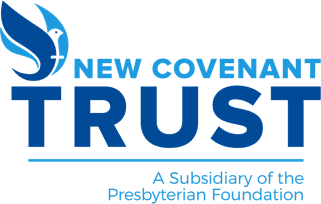
New Covenant Trust Company (NCTC) was pleased to host a webinar on responsible investing, in partnership with the Presbyterian Church (U.S.A.). The webinar explored the impact of values-based investment strategies on financial markets and social change, as well as the impact on investors who choose to incorporate these types of strategies.
Moderated by Rev. Dana Waters, a Ministry Relations Officer at the Presbyterian Foundation, the discussion featured expert insights from NCTC, the Committee on Mission Responsibility Through Investment (MRTI), and the Interfaith Center on Corporate Responsibility (ICCR). The conversation highlighted the theological and financial dimensions of responsible investing, a movement deeply embedded in Presbyterian tradition.
Rev. Waters rooted the discussion in scripture, emphasizing the biblical mandate for stewardship and the church’s call to care for creation. He encouraged attendees to reflect on their role in healing and restoring the world through ethical financial decisions.
Defining Responsible Investing
James Carey, Vice President of Investments at NCTC, shared the history and framework of socially responsible investing in the Presbyterian tradition. He noted that Presbyterians have been pioneers in this space since the 1970s, when they opposed U.S. corporate involvement in South Africa during apartheid.
“Church investment is more than a practical question; it is also an instrument of mission,” he quoted from a 1971 General Assembly declaration.
Carey outlined three key responsible investing tools investors can use when building portfolios:
- Negative Screening (Divestment): Excluding investments in industries that conflict with an investor’s values, such as fossil fuels, for-profit prisons and assault weapons.
- Positive ESG Integration: Evaluating companies based on environmental, social and governance (ESG) criteria, favoring firms that demonstrate responsible practices.
- Impact Investing: A rapidly growing tactic that focuses on investing in projects that generate both financial returns and measurable social or environmental benefits, such as affordable housing, renewable energy and economic development initiatives.
“We absolutely would recommend implementing all three of those if you want to maximize your impact as an investor,” Carey said. He added that making a social impact through investing does not mean sacrificing financial performance.
“You can and should earn a market rate of return,” he said, citing long-term data demonstrating that responsible investment portfolios perform comparably to traditional ones.
MRTI and Shareholder Engagement
Katie Carter, Director of Faith-Based Investing and Shareholder Engagement for the PC(USA), provided an overview of MRTI’s efforts to engage with corporate shareholders. She described MRTI as “ambassadors of Presbyterian values” who advocate for responsible corporate behavior on issues such as climate change, human rights and governance.
Carter explained MRTI’s shareholder engagement process, which includes dialogue, filing shareholder resolutions and, in cases where companies fail to act, recommending divestment.
“Faith-based investors like the PC(USA) have a unique role in the shareholder advocacy ecosystem and are often bringing emerging issues to companies that become major issues down the road,” said Carter.
One recent success involved AIG, a major insurance company, which committed to reducing its greenhouse gas emissions after years of investor pressure. Similarly, Becton Dickinson agreed to disclose information on its environmental justice efforts in response to advocacy from MRTI and community partners.
She also highlighted the challenges facing responsible investors, particularly political pushback against ESG principles.
“Legislators are working to pass laws that make it harder to invest based on environmental and social concerns,” Carter said, noting that MRTI and other faith-based investors have been targeted by congressional inquiries.
She encouraged individual investors and congregations to participate by aligning their investments with PC(USA) guidelines and using MRTI’s proxy voting recommendations.
“If you have personal, congregational or institutional investments, following the proxy voting guidelines is a simple and effective way to push companies on justice issues that matter to you and the church,” she said.
The Broader Landscape
Tim Smith, Senior Policy Advisor for ICCR, placed the PC(USA)’s work within the broader movement of faith-based investing. ICCR, which began in 1971 with strong Presbyterian involvement, now includes a coalition of over 300 institutional investors managing more than $4 trillion in assets.
“These investors are engaging literally hundreds of companies every year to engage on greater expectations and environmental, social and governance issues,” Smith said. “This is work that will both change policies and practices, but we hope will mitigate risks for companies.”
Smith pointed to victories where shareholder pressure led major corporations to adopt racial equity audits, climate action plans and fair labor practices. However, he also acknowledged the growing opposition to responsible investing.
“There’s a significant political and legal effort to undermine ESG principles,” he said, citing over 450 bills introduced in 28 state legislatures that target socially responsible investment strategies.
Despite these challenges, Smith remains optimistic, noting that many major asset managers and corporations continue to support environmental and social investing principles.
A Call to Action
The webinar concluded with a Q&A session, where panelists addressed topics including investment policy statements, how to evaluate corporate performance, and the importance of proxy voting. Carey emphasized that investors of all sizes can contribute by voting their proxies according to MRTI guidelines.
“You don’t have to change your investments to make a difference — just vote your values,” he said.
Rev. Waters closed the session with a blessing, affirming the role of faithful stewardship in advancing God’s mission.
Through insightful and practical guidance, the webinar emphasized the PC(USA)’s longstanding commitment to investing in ways that honor faith-based values while achieving financial sustainability. By embracing responsible investing, Presbyterians and other faith-driven investors can wield their financial influence to promote justice, sustainability and corporate accountability in alignment with their values.
To view a recording of the webinar, click here. For more information about values-based investing, schedule a call with New Covenant Trust Company by completing an interest form here.
